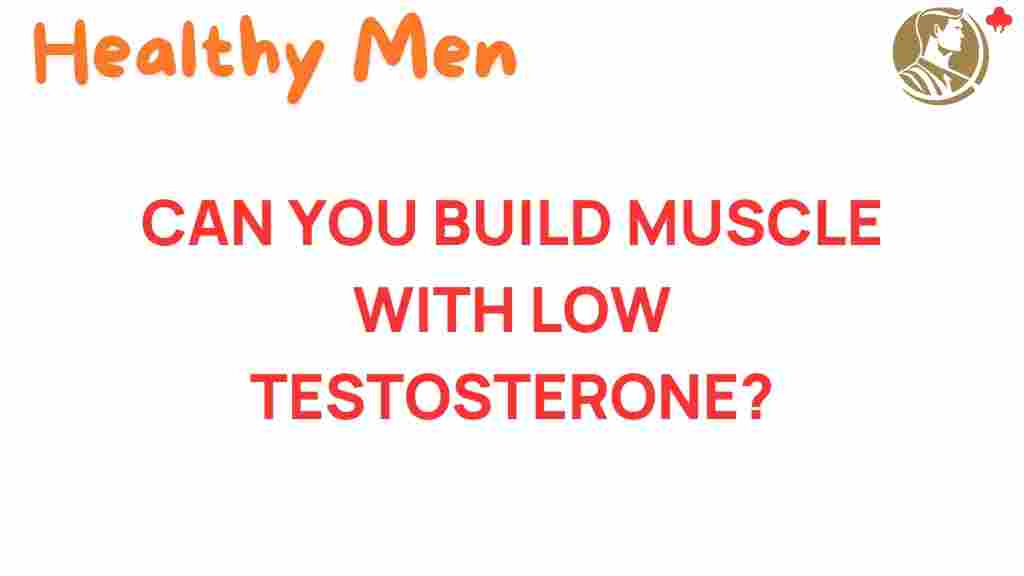The Muscle Myth: Can Low Testosterone Still Fuel Gains?
When it comes to muscle building and fitness, testosterone is often heralded as the king of hormones. This powerful steroid hormone plays a crucial role in developing strength, increasing muscle mass, and improving overall body composition. However, many individuals find themselves plagued by low testosterone levels and question whether they can still achieve significant gains in the gym. In this article, we will explore the relationship between low testosterone and muscle building, dissect the myths surrounding it, and provide a comprehensive guide to optimizing your workouts and health.
Understanding Testosterone and Its Role in Muscle Building
Testosterone is primarily produced in the testicles in men and the ovaries in women, with smaller amounts produced by the adrenal glands. This hormone is vital for several bodily functions, including:
- Promoting muscle growth and strength
- Contributing to healthy bone density
- Regulating fat distribution and metabolism
- Enhancing libido and sexual function
However, as men age, testosterone levels naturally decline. Factors such as obesity, stress, poor diet, and lack of exercise can also contribute to low testosterone levels. This decline raises concerns about how it affects strength training and workout effectiveness.
The Impact of Low Testosterone on Body Composition
Body composition refers to the proportion of fat and non-fat mass in your body. Low testosterone can significantly affect body composition, leading to:
- Increased body fat
- Decreased muscle mass
- Lower energy levels
- Poor recovery from workouts
These effects can make it challenging to achieve your fitness goals, but it does not mean that gains are impossible. Understanding how to work with low testosterone levels is key.
Can You Still Build Muscle with Low Testosterone?
The short answer is yes; you can still build muscle even if you have low testosterone. While testosterone is important for muscle growth, other factors also contribute significantly to muscle building and overall health.
Factors Influencing Muscle Growth Beyond Testosterone
Here are several critical factors that can positively influence your ability to build muscle, even with low testosterone levels:
- Nutrition: A well-balanced diet rich in protein, healthy fats, and carbohydrates provides the necessary fuel for muscle growth. Adequate protein intake is especially vital, as it supplies the amino acids required for muscle repair and growth.
- Strength Training: Engaging in regular strength training exercises helps stimulate muscle hypertrophy. Focus on compound movements, such as squats, deadlifts, and bench presses, which work multiple muscle groups.
- Consistency: Regularity in workouts and nutrition is crucial for long-term gains. Sticking to a schedule can yield significant results over time.
- Recovery: Allowing your muscles time to recover is essential. Incorporate rest days and ensure you get adequate sleep to support muscle growth and overall health.
- Supplementation: Some supplements, such as creatine, branched-chain amino acids (BCAAs), and vitamin D, may help enhance muscle growth and recovery.
Step-by-Step Process for Building Muscle with Low Testosterone
If you’re navigating low testosterone levels but still want to maximize your muscle growth potential, follow these steps:
1. Assess Your Diet
Ensure you consume enough calories to support muscle growth. Focus on:
- High protein foods (e.g., lean meats, fish, eggs, dairy, legumes)
- Healthy fats (e.g., avocados, nuts, olive oil)
- Complex carbohydrates (e.g., whole grains, fruits, vegetables)
2. Design a Strength Training Program
Your program should include:
- 3-4 days of strength training per week
- Compound lifts that engage major muscle groups
- A mix of heavy lifting (low reps) and lighter weights (high reps)
3. Prioritize Recovery
Incorporate the following into your routine:
- At least one rest day per week
- Quality sleep (7-9 hours per night)
- Active recovery days with light activities like walking or yoga
4. Monitor Your Progress
Keep track of your workouts, nutrition, and any changes in your body composition. This will help you identify what works best for you and adjust accordingly.
5. Consider Professional Guidance
If you are struggling, consider consulting a fitness professional or a nutritionist who can provide personalized advice.
Troubleshooting Low Testosterone and Fitness Challenges
Despite your best efforts, you may encounter challenges while trying to build muscle with low testosterone. Here are some common issues and how to address them:
Fatigue and Low Energy
Feeling fatigued can hinder your workouts. To combat this:
- Evaluate your sleep quality and quantity. Aim for 7-9 hours of restorative sleep.
- Incorporate light cardio to boost energy levels.
- Consider adjusting your workout times to when you feel most energetic.
Plateauing Progress
If you notice your gains stalling, try:
- Changing your workout routine (e.g., different exercises, rep ranges, or intensity)
- Increasing your caloric intake slightly to support muscle growth
- Ensuring your recovery protocols are adequate
Managing Stress
High stress can negatively impact testosterone levels and your overall health. To manage stress:
- Incorporate mindfulness practices such as meditation or yoga
- Engage in hobbies that relax you
- Consider talking to a mental health professional if needed
Conclusion: Building Muscle with Low Testosterone is Possible
In conclusion, while low testosterone levels can present challenges, they do not make muscle building impossible. By focusing on nutrition, consistent strength training, recovery, and monitoring your progress, you can still achieve significant gains. Remember that fitness is a journey, and understanding your body’s unique needs is essential for long-term success.
If you want to learn more about optimizing your health and fitness, check out this comprehensive guide on nutrition and exercise strategies.
Additionally, for more insights on hormone health and fitness, visit this external resource that provides valuable information.
Ultimately, embrace the process, stay committed, and you’ll find that with the right approach, even with low testosterone, you can build the body you desire.
This article is in the category Fitness and created by healthymen Team
